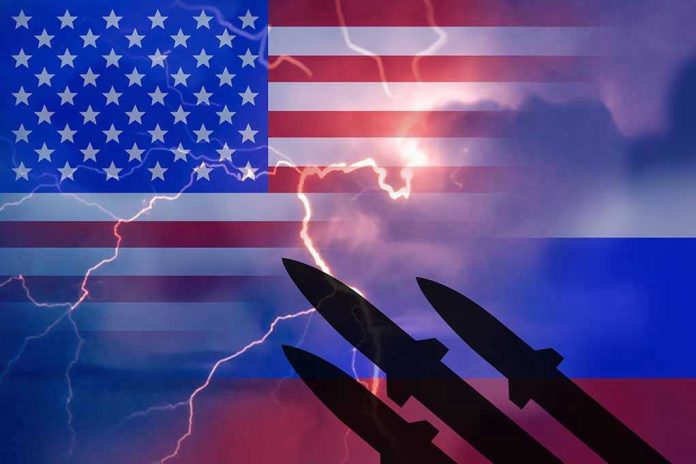
Russian military intelligence is testing American resolve just 15 miles from Hawaii’s coast, reigniting concerns about our nation’s security as the Trump administration restores constitutional leadership.
Story Snapshot
- Russian spy ship Kareliya monitored just 15 nautical miles from Hawaii, near critical U.S. military assets
- U.S. Coast Guard responded quickly, deploying air and sea assets to protect American borders
- Incident highlights persistent foreign intelligence threats and the strategic importance of Hawaii
- Trump administration’s decisive approach contrasts with the law enforcement posture seen under previous leadership
Russian Spy Ship Breaches the Pacific’s Doorstep
On October 29, 2025, the U.S. Coast Guard detected the Russian Navy auxiliary vessel Kareliya, a Vishnya-class intelligence ship, operating just 15 nautical miles south of Oahu, Hawaii.
The Coast Guard immediately dispatched an HC-130 Hercules aircraft and the cutter USCGC William Hart to monitor and escort the vessel, which remained right at the edge of U.S. territorial waters.
The proximity of this foreign military asset to one of America’s most important strategic regions triggered heightened alert and underscored ongoing threats to national sovereignty and security.
This incident is not an isolated event. Vishnya-class ships like Kareliya have a history of intelligence-gathering near U.S. shores, with previous sightings off Hawaii in 2021 and 2022.
Additionally, the Viktor Leonov, another Russian spy vessel, routinely operated off the U.S. East Coast between 2014 and 2020, often pushing the boundaries of international norms.
These repeated incursions are part of a larger pattern of Russian efforts to probe American defenses and gather sensitive information on military operations, especially in regions vital to national defense.
Strategic Stakes: Why Hawaii Is a Prime Target
Hawaii is not just a vacation paradise—it is the Pacific Fleet’s command center and home to critical missile ranges and military installations. This makes the region a prime target for foreign intelligence operations, particularly from adversaries like Russia.
The fact that the U.S. Coast Guard, rather than the Navy, led the response signals a law enforcement and homeland security approach, but also exposes vulnerabilities and jurisdictional limits when facing foreign military threats just outside territorial waters.
These realities demand strong, constitutionally grounded leadership to ensure America’s defenses remain robust and uncompromised.
International law allows foreign vessels to operate in international waters as long as they stay outside the 12-nautical-mile territorial limit. While technically within legal boundaries, the Kareliya’s close approach is a clear reminder that adversaries will exploit every loophole to gather intelligence, test U.S. resolve, and challenge American sovereignty.
Under the Trump administration, there is renewed focus on drawing firm lines and projecting strength at America’s borders—whether on land, sea, or air.
America’s Response: Security, Leadership, and Conservative Vigilance
The Trump administration has prioritized restoring constitutional order, protecting U.S. borders, and ending the era of complacency seen under previous leadership. Coast Guard officials emphasized the routine nature of monitoring such vessels, but the context has changed: Americans are demanding a proactive defense of national interests, not reactive posturing.
With rising global tensions and repeated tests from adversaries, the need for robust maritime security has never been clearer.
In the immediate term, the U.S. Coast Guard’s surveillance posture has been strengthened, with increased public awareness of foreign military activity near U.S. shores. Over the long term, the pattern of Russian intelligence-gathering off Hawaii underscores the necessity of investing in surveillance and counterintelligence capabilities.
The Trump administration’s consistent emphasis on border security, defense spending, and American sovereignty stands in stark contrast to the indecisive, globalist approaches of the past. These events are not just maritime maneuvers; they are challenges to the constitutional foundation and security of the United States.
Experts and defense analysts agree: while such intelligence missions are routine, the stakes are higher than ever. Hawaii’s military significance, combined with the increasingly assertive actions of foreign adversaries, means that American vigilance must be unwavering.
The Trump administration’s approach—rooted in constitutional principles, decisive action, and unyielding defense of national interests—offers the leadership Americans expect in uncertain times. As foreign threats loom close to our shores, conservative values and constitutional commitment remain our strongest safeguard against those who would test or erode American sovereignty.
Sources:
Russian spy ship lurks off Hawaii coast: US Coast Guard on high alert to protect borders
U.S. Coast Guard Tails Russian Spy Ship Just 15 Miles Off Hawaii




